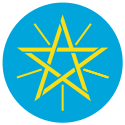- Oromo Peoples' Democratic Organization
-
Oromo Peoples' Democratic Organization Leader Alemayehu Atomsa Founded 1989 Headquarters Addis Ababa, Ethiopia Youth wing OPDO Youth League Ideology Democratic socialism,
Social democracy,
Oromo Self-determinationWebsite http://www.opdo.org.et/ Ethiopia 
This article is part of the series:
Politics and government of
Ethiopia
The Oromo Peoples' Democratic Organization (OPDO) is an ethnic-based political party in Ethiopia, and part of the alliance with the Amhara National Democratic Movement, the South Ethiopian Peoples' Democratic Front and the Tigrayan Peoples' Liberation Front that forms the Ethiopian People's Revolutionary Democratic Front (EPRDF). At the last legislative elections, 15 May 2005, the party was part of the Ethiopian People's Revolutionary Democratic Front, that won 327 out of 527 seats.[1]
In the August 2005 Regional assembly elections, the party won 387 out of 537 seats in the Oromia Region, and 14 out of 36 seats in the Harari Region.[2]
History
The OPDO was created in late 1989 by the EPRDF after they grew dissatisfied with their relations to the existing Oromo Liberation Front against the Derg regime. At first a weak organization, according to Paul B. Henze, the OPDO attracted defectors from Derg military units and gained supporters when in 1991 the EPRDF occupied parts of the provinces of Wollo and Shewa which had significant Oromo majorities.[3]
In 2001, the OPDO was rocked by a series of corruption scandals, which led to the ouster of then secretary general Kuma Demeksa on charges of corruption, "anti-democratic practices", abuse of power and nepotism. Major-General Abadula Gemeda at the time resigned his commission in the Ethiopian National Defense Force and took control of the entroubled OPDO.[4]
The OPDO held their fourth congress on 23 February 2006 in Adama.[5]
In the 2008 by-elections, the OPDO won 23 seats in the Oromia Regional legislature, and 613 seats from 108 kebeles for elections to the Kebeles Peoples' Representatives Council.[6]
Notes
- ^ Ethiopian House of Peoples' Representatives Website
- ^ African Elections Database
- ^ Paul B. Henze, Layers of Time: A History of Ethiopia (New York: Palgrave, 2000), p. 322.
- ^ "Ethiopian general opts for politics", BBC-Africa, 30 July 2001 (accessed 13 March 2009)
- ^ "The Fourth Conference of O.P.D.O. Kicks off at Adama" (Oromia State Government website, accessed 6 October 2006)
- ^ "The National Electoral Board of Ethiopia Official Result of the Local and By-Elections Held on April 13 and April 20, 2008", Walta Information Center, May 2008 (accessed 17 March 2009)

This article about an African political party is a stub. You can help Wikipedia by expanding it.
